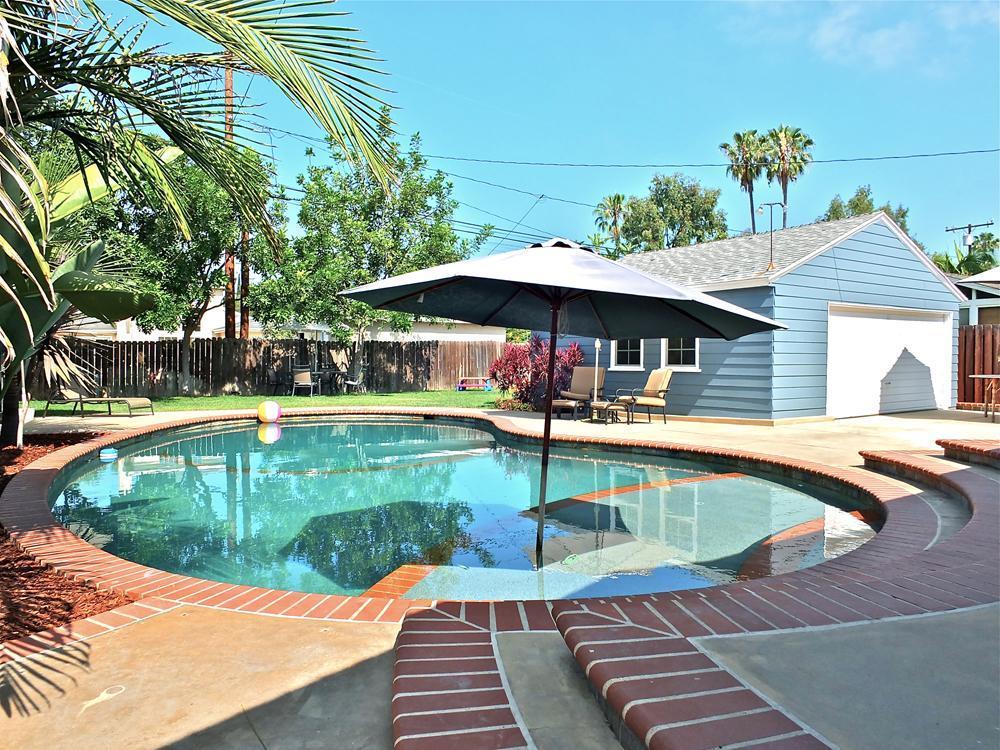Summer is around the corner and what better way to cool off from the SoCal heat than to take a dip in your very own pool? If you’re looking to buy a home with a pool, it’s important to understand the commitment you’re getting yourself into. Pools require a lot of maintenance and can be a very costly investment.
What to Look for in a Home with a Pool
Economically it usually makes sense to buy a home with a pool rather than add a pool. Pool homes come in many different price ranges. Pool homes in Long Beach, Lakewood, and surrounding communities start at about $600,000 and go up to $6 million or more.
Cost of a Pool Versus Value of a Pool
Want to add a pool to your existing home? While adding a pool doesn’t necessarily increase your home’s value, it can have a positive impact if you live in a higher-end neighborhood and most of your neighbors have pools and if your yard is large enough to accommodate a pool and still have some yard left over for play or gardening.
The price for a standard pool starts at about $30,000. When you add in details like safety fences, waterfalls, lighting, landscaping, heating, and perhaps a spa, you could easily approach $100,000 or more. Costs will also depend on the type of pool you choose. Gunite is the most popular in-ground pool material. It is a mixture of cement and sand, which can be poured into almost any shape. It has replaced concrete pools as the sought-after standard.
Adding a pool could increase your annual property taxes but won’t necessarily add to your home’s selling price so try to keep your total building cost between 10% and 15% of what you paid for your home so you don’t invest too much in an amenity that won’t pay you back. You’ll need to get permits for your pool and the work can take 45-60 days after you have your permits.
Pool Options
Saltwater Versus Chlorine
While chlorine pools are more common, saltwater-filled pools are also an option. Though both types use chlorine to maintain sanitation, saltwater pools produce their own chlorine via a saltwater generator and thus require less maintenance. If you have a chlorine pool, you will have to regularly add chlorine tablets or powder and monitor the PH levels. In general, chlorine pools tend to require more time and money to maintain, whereas saltwater pools are mostly self-sustaining. However, the initial cost of a saltwater generator is costly.
When choosing between a saltwater or chlorine pool, the main difference is that a saltwater pool has less chemicals (you won’t experience the red, itchy eyes that sometimes results from a chlorine pool) and doesn’t require constant upkeep. Alternatively, technology to install and operate chlorine pools has been around much longer and is often considered the easiest, safest option. Chlorine pools are also much more affordable to initially install.
Shape & Style
Choosing the shape and style of your pool is the fun part, but it can also be a tough decision. Style-wise, you can choose from a variety of options including Traditional, Tropical, Mediterranean, and Modern. In addition to the style, pools today come in many shapes and sizes. If you want to use your pool for exercise, consider a rectangle lap pool. If you plan to use your pool mostly for relaxing and entertaining, an infinity pool may be your best bet. Pools are also a great way to add to the overall appearance of your home, in which case perimeter-overflow pools are a stylish option.
Materials
The three most common materials used to build the interior of pools are concrete, vinyl, and fiberglass. Concrete pools are the easiest material to use for molding pools into specific shapes. Vinyl pools are beneficial because nowadays there is a great selection of patterns and colors available. Fiberglass pools typically come pre-manufactured but can be individualized with custom jets and ceramic tiles
What Does It Cost To Maintain A Pool?
Before you either add a pool or buy a pool home, consider the maintenance. Will you handle it yourself or hire someone? In a recent survey, homeadvisor.com determined that on average, it costs $190 a month to maintain a home pool. The cost of maintenance varies depending on the type of pool you have and if you plan to do the work yourself or hire someone. However, if not properly taken care of, pools will become unsightly and unsanitary.
Safety First
If there are young kids in the family pool safety is always an area of concern. Unfortunately, unintentional drowning is a leading cause of death in the United States. Luckily, there are ways to prevent the worst-case scenario by being prepared and vigilant.
-
Enroll Children in Swimming Lessons
- Children as young as one year old can start taking water survival skills and swim lessons. Studies suggest children between ages 1-4 who take these classes reduce their chances of drowning. The American Academy of Pediatrics believes most children ages four and up are ready for full-fledged swimming lessons including floating, treading water, and learning to get to an exit point. Long Beach has many public pools that offer swimming lessons. If you’re unsure which class is right for your child, we recommend giving your local pool a call to see what they offer.
-
Learn CPR
- The Red Cross offers online CPR training for just $35.00. It covers valuable safety information including first aid and how to handle breathing and cardiac emergencies involving adults, children, and infants. The course is less than three hours but this training could help you save someone’s life. While you’re on the Red Cross website, you can also check out the section about swimming lessons for kids, and find a class that way.
-
Install A Safety Cover, Alarms, And A Pool Fence
- When thinking about pool covers, many people probably think of the common mesh or tarp that is been as public pools. However, a solid safety cover is an option as well. They can be installed with anchors to help prevent children from falling into the pool. The prices for these covers can run a bit steep, but it’s a small price to pay when it comes to pool safety.
- There are many different types of alarms you can install to increase pool safety. You can install alarms that ring when doors and windows open in case someone sneaks out of the house. There are also alarms that ring when pool gates or screens are opened. A wave alarm that rings when there is a disturbance in pool water is another good option. Each type of alarm has its pros and cons so consider your needs and what is best for your family when making a decision.
- Pool fences are a great way to keep children (and pets) out of the pool. They run much cheaper than a safety cover, so if cost is a concern this could be a good option. They come in a variety of heights and materials so you can rest assured you will be able to find the right one to keep your family safe.
-
Talk To Your Children About Pool Safety
- As soon as they can understand you it’s important to talk to your children about pool rules. Rules like never swim alone, no roughhousing, and stay away from drains and covers, are important for kids to know. If you start discussing and enforcing the rules when they’re young, pretty soon they will be second nature.
Don’t forget: Even though spas are much shallower than pools, they can still be a drowning hazard. All of the rules above apply to spas too.
Insurance
There are many different types of insurance for pools, so it’s important to talk to an expert before purchasing a policy. While homeowner’s insurance will cover some pool-related issues, it’s important to make sure you’re covered in all events. You’ll want to make sure you’re covered for damage, but also any liability you may incur as well. This is why installing the safety precautions mentioned above are always a good idea. They can help prevent injuries and the possibility of getting sued.
Bottom Line
At the end of the day, pools are a great way to cool off and have some fun. Just be sure you know what you’re signing up for. If you decide a pool isn’t worth it, we have some other tips to help you stay cool this summer!
If a home with a pool is on your list, we’d love to help you find it. Please fill out the form below and we can help you get your search started! In the meantime, here is a list of homes with pools you can browse.
[License Error #28.2 - The Showcase IDX license for this website is not active or doesn’t exist.]


Leave a Reply